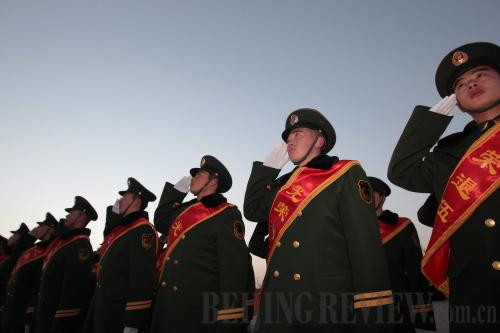|
 |
|
SENTRIES BID FAREWELL: Members of the Tiananmen Safeguarding Regiment of the Chinese People's Armed Police Force salute to the national flag at Tiananmen Square in Beijing on November 24 right before retiring from military service (XING GUANGLI) |
Supporting Lawyers
China aims to better protect lawyers' rights and facilitate their work through enhanced financial and policy support, says the Ministry of Justice.
Efforts will be made to better protect a lawyer's right to meet with their clients in police custody and facilitate their rights to review documents, conduct necessary investigations and collect evidence, the ministry told Xinhua on November 23.
The ministry, which recently issued a circular on its proposal to further improve work concerning lawyers, called for a system to guarantee funding for legal work.
"Lawyers should be subsidized if working as legal advisors to the government or providing legal services for the public interest," the ministry said.
Also, government agencies are urged to continue their financial support for government-funded law offices in underdeveloped regions and offer more funding for legal training.
Pressure on Power
China might face pressures related to power supply this winter due to cold weather, surging coal prices, and government measures for energy conservation and emission cutting, the head of China's largest power supplier said on November 23.
China's northeastern and northwestern regions, and eight northern provinces, usually the coldest areas in the country, reported record high power consumption during the first half of November, said Liu Zhenya, General Manager of the State Grid Corp. of China.
Figures from the National Power Dispatch and Communication Center showed both power output and consumption increased in the first half of November, up by 8.9 percent and 7 percent respectively over the same period last month.
Measures taken by local governments to conserve energy and cut emissions are sure to have effect on power producers and would affect power output, said Liu.
Cities including Beijing, Tianjin, Chong-qing, and provinces of Shandong, Jiangsu, Zhejiang may face power shortages in the coming peak consumption period, Liu said.
Safer Online Drugs
China's drug watchdog has launched a campaign to expose and crack down on illegal selling of drugs on the Internet.
"Food and drug administration departments at all levels should explore effective methods to stop the sale of fake or inferior-quality drugs, especially those advertised and sold on the Internet," said Shao Mingli, head of the State Food and Drug Administration (SFDA), on November 23.
According to SFDA's monitoring on six major search engines including Google and Yahoo, after typing the key words of "medicine" plus a type of common disease, such as "diabetes" or "high blood pressure," 10 to 30 percent of search results contained illegal drug-related information.
Figures show that, among 196 Web pages being monitored, 96 percent did not have or failed to show certificates for drug-related trades or other services. Thirty-nine percent have no permit to run Web sites from China's telecommunication management departments.
Persuasive Workers
The provincial federation of trade unions in Yunnan Province has recently trained about 400 city- and county-level union officials on how to negotiate wage increases with enterprises in a period of rising consumer prices.
The week-long training, which ended on November 22 and included courses such as negotiation tactics and skills, was designed to promote collective contract signing and to extend the negotiation mechanism to all enterprises in the province, Lu Zhengguo, Vice Chairman of Yunnan Federation of Trade Unions, was quoted as saying by China Daily.
The training is important for teaching province-wide trade union leaders how to help employees to ask for higher pay when goods prices are rising rapidly, Lu said.
| 